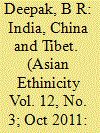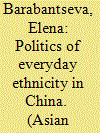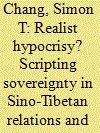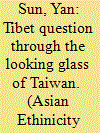|
|
|
Sort Order |
|
|
|
Items / Page
|
|
|
|
|
|
|
| Srl | Item |
| 1 |
ID:
107675


|
|
|
|
|
| Publication |
2011.
|
| Summary/Abstract |
The rationale behind this paper is to stimulate reflection, open a debate and provide its readers with some much overlooked perspectives, perceptions and approaches from China, India and the Tibetan émigrés in India as regards the Tibet issue. These are formulated on the basis of author's interviews and enquiries with the representatives of the Dalai Lama's Tibetan Government in Exile, the leaders of Tibetan Youth Congress, the representatives of Students for a Free Tibet, as well as the Tibetan émigré in India and ordinary Indians. Besides, the paper also throws light on major differences and contradiction between India and China over Tibet issue; the future course of the Tibetan movement; and explores the possibilities of establishing a mechanism between India and China on Tibet.
|
|
|
|
|
|
|
|
|
|
|
|
|
|
|
|
| 2 |
ID:
107678


|
|
|
| 3 |
ID:
107676


|
|
|
|
|
| Publication |
2011.
|
| Summary/Abstract |
Since the takeover of Tibet by the PRC in 1951, two opposing stances of Tibet's standing vis-à-vis China have dominated academic and popular sources ever since. One topic occupying the central place of limelight is nonetheless 'sovereignty', a word originating only from the political history of Western Europe in the mid-17th Century, and by no means a self-evident concept for Tibet and Imperial China. While statecraft in the West is deeply embedded in and accordingly judged by this 'realist' thinking, China and Tibet were not 'sovereign' as many Chinese and Tibetans have been taught to assume. This study briefly examines the evolution of the so-called Sino-Tibetan 'benefactor-priest relations' (Mchodyon, ) since the end of the 19th century and how the UK and US selectively applied/compromised the script of sovereignty to suit themselves. The results show that major powers outside this region (mainly the United Kingdom and the United States) were the major beneficiaries of this hypocritical 'scripting'.
|
|
|
|
|
|
|
|
|
|
|
|
|
|
|
|
| 4 |
ID:
107674


|
|
|
|
|
| Publication |
2011.
|
| Summary/Abstract |
In recent years what has been witnessed is that Indians have been encouraged to study contemporary China not only due to the cultural richness of that civilization, but also because of China's already significant influence on world events. In fact, with the incorporation of Tibet into the People's Republic of China (PRC) in 1950 and the Government of India's oft-repeated official acknowledgement of Tibet as an autonomous region of China, the PRC ceased to be a 'distant neighbour' and became as proximate to India as the states of the Indian subcontinent itself. Obviously, for Indian scholars whose prime focus is South Asia, there is an imperative to study China as well. Tibet, which has been one of the key areas of China studies, needs to be researched comprehensively so as to gauge the extent of its influence on China studies in India in general and India-China relations in particular. It is in this context that this paper seeks to examine how academics, journalists, policy makers, politicians and China studies experts in India have viewed Tibet so far as its influence on India-China relations in the broader context is concerned. It also highlights the viewpoints of Chinese scholars on such issue, besides examining whether Tibet would continue to be an important factor impacting China Studies in India.
|
|
|
|
|
|
|
|
|
|
|
|
|
|
|
|
| 5 |
ID:
107677


|
|
|
|
|
| Publication |
2011.
|
| Summary/Abstract |
This paper evaluates the Tibet question through the looking glass of Taiwan, by considering four dimensions of comparative dynamics between the two cases of Taiwan and the Tibetan government-in-exile (TGIE) in relation to China: territorial, economic, ethnic and cultural. Of the four, the paper argues, Taiwan has high convergence with China in the economic, ethnic and cultural dimensions, and managed divergence in the territorial dimension. The TGIE, on the other hand, has high divergence with China in all four dimensions: territorial dispute, economic incongruence, ethnic estrangement, and cultural gulf. Further, the TGIE is ideologically and sentimentally charged by this divergence and thrives by exploiting it. It therefore should have few incentives to see the lessons of Taiwan applied in resolving the Tibet question.
|
|
|
|
|
|
|
|
|
|
|
|
|
|
|
|
| 6 |
ID:
107671


|
|
|
|
|
| Publication |
2011.
|
| Summary/Abstract |
This paper goes into go the reasons why 'Tibet studies' are an important contemporary field of research, the topics which need urgent attention, and the state of Tibet studies in India. An interesting aspect of Tibet studies is the diversity of the fields to be researched. It covers topics as disparate as geography, environmental sciences, climatology, geology, archeology, paleontology, biology, religion, sociology, and, of course, strategic studies and historical research.
|
|
|
|
|
|
|
|
|
|
|
|
|
|
|
|
| 7 |
ID:
107673


|
|
|
|
|
| Publication |
2011.
|
| Summary/Abstract |
This paper takes up the study of Tibet in Australia, Hong Kong and Singapore. Tibet studies are defined through scholars working in universities in the specified countries/regions who have published works in which the Tibetans and the Tibetan areas of China are focal. The methodology is to analyse selected published works on Tibet as well as to interview selected scholars. The paper attempts to draw some characteristics of Tibet studies in the regions or countries specified, defined according to factors such as discipline, priority of language, area of interest, approach or political stand. It reaches no grand conclusions, but finds that the spectrum of Tibet studies in the places considered is fairly wide and, though not comparable with several other countries, the value is quite high in terms of quantity and quality.
|
|
|
|
|
|
|
|
|
|
|
|
|
|
|
|
| 8 |
ID:
107672


|
|
|
|
|
| Publication |
2011.
|
| Summary/Abstract |
This paper outlines the present situation of Tibetology in contemporary China and shows the achievements and latest developments of Tibetology in contemporary China. It highlights the characteristics of Tibetology in contemporary China, based on analyzing the main fields of Tibetology. Furthermore, this paper assesses the dynamics and excellent features of Tibetology in China.
|
|
|
|
|
|
|
|
|
|
|
|
|
|
|
|
|
|
|
|
|